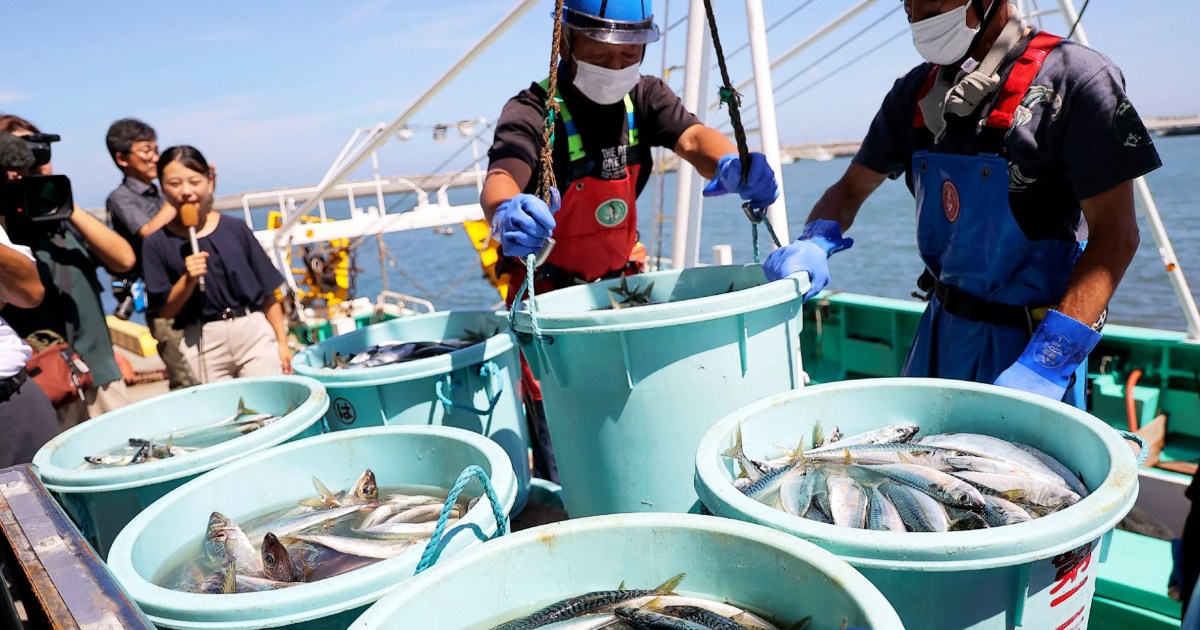The United States has started bulk buying Japanese seafood to supply its military there in response to China’s ban on such products imposed after Tokyo released treated water from its crippled Fukushima nuclear plant into the sea.
Unveiling the initiative in a Reuters interview on Monday, U.S. ambassador to Japan Rahm Emanuel said Washington should also look more broadly into how it could help offset China’s ban that he said was part of its “economic wars.”
China, which had been the biggest buyer of Japanese seafood, says its ban is due to food safety fears.
The U.N.’s nuclear watchdog vouched for the safety of the water release that began in August from the plant wrecked by a 2011 tsunami. G7 trade ministers on Sunday called for the immediate repeal of bans on Japanese food.
Yes, China, well known for it’s cleanliness and sanitation, is worried about “food safety”. Sure.
Two words: Gutter Oil
That… That beats mine. Kai Dang Ku
It depresses me to still seeing these days out on the streets.
The fish is not radiated enough for them. It adds flavor.
It really makes the MSG pop.
China bad give upvotes
wumao begone
Stereotypes exist for a reason
I mean, there is a dish in Japanese cooking too that’s similar https://en.m.wikipedia.org/wiki/Ikizukuri
But you see, it’s only bad when China does it.
Seriously, why are people so convinced that China’s ban is not actually about food safety. Where’s the evidence? China is not the only party that has expressed concerns about the planned release of wastewater. It’s not even the only country that has banned the import of Japanese seafood.
The onus for evidence actually is on China. The UN nuclear watchdog says the water is safe. China needs to provide evidence to the contrary.
That makes no sense. They don’t have to prove anything. If China thinks Japan has not provided the necessary information to ensure that seafood imported from Japan is safe, they can choose to stop buying Japanese seafood. Japan can negotiate and provide the evidence China is asking for if they want to continue selling seafood to Chinese customers. What’s so crazy about that?
Here’s a simple fact, there are Chinese nuclear plants that are releasing more tritium into the ocean during normal operations than Fukushima is, or ever will.
Another simple fact, all the tritium released worldwide is basically negligible when you look at the diffusion rates in ocean water.
I’ve got no clue what China is really wanting with the seafood ban, but it’s not to punish Japan for releasing Fukushima water.
I’ve got no clue what China is really wanting with the seafood ban
To stir conflict and make Japan out to be the bad guy using misinformation.
Sounds like a seafood trade embargo with extra excuses.
have economic problems at home -> pick fights abroad -> blame problems at home on “anti-Chinese sentiment” abroad
It’s quite interesting seeing another country that’s very critical of the US make the exact same mistakes that the US has. It’s a bad portent for their future
Dilution is always the solution baby. Something so simple, yet still so impossible to explain to people who believe in chem trails.
Tbf, that’s kinda what people thought about leaded gasoline, or greenhouse gas emissions.
In this case, yes, everyone seems perfectly fine, but dilution isn’t the solution to everything when the body you’re diluting into is finite.
Dilution would technically still be a solution for both of those problems, the issue is just user input error. If you don’t have the reagents to dilute a proper solution then you have too many solutes.
No…
For those it turned out we weren’t adequately diluting it. And we know a lot more about radionuclides than we knew about those back then.
Well yeah, that’s because the science of homeopathy tells us that diluting things makes them stronger! /s
This entire disaster is a great lesson in why when your engineers say “This site isn’t suitable for a reactor” or “this seawall is insufficient to prevent a tsunami from overwhelming the reactor” you really should listen to them.
The real solution to nuclear disasters is not having them to begin with.
Not necessarily. There are concerns about the wastewater still contains radionuclides which are heavier than tritium and tend to bioaccumulate. As such, it’s possible even if they are not highly concentrated in the release water, they could reach unsafe levels in marine life.
So take a sample of fish from each catch and test them for those levels. This isn’t that difficult.
I agree that testing catches may be a solution here. However, I don’t see why it’s incumbent on China to create such a testing infrastructure especially when they aren’t the only ones with concerns. If Japan wants to negotiate and work something out I’m sure they can. In fact I’d be willing to bet that’s what they’re doing at this very moment.
Here’s the thing, Uranium is already present in seawater at concentrations far above what you would get if you dumped the entirety of Fukushima’s corium straight into the ocean.
See, there’s a common form of uranium oxide that’s water-soluble. A large part of the world’s free uranium is already in the ocean in solution.
What’s your point? Uranium is not the only fissile radionuclide that can make its way into the contaminated wastewater. Also nuclear fuel contains a much higher concentration of fissile Uranium isotopes than what is found in nature. Lastly, the radionuclides in the wastewater are not going to be evenly mixed across all of the worlds oceans so that’s not exactly a useful thought experiment.
Let me put it this way, you could dump ten thousand Fukushimas straight into the ocean and given time to diffuse a bit, not notice a difference in oceanic uranium content.
The Oceans contain 1000 times more uranium than the known terrestrial deposits. This naturally includes the fissile isotopes.
But the real point is that it’s actually fairly easy to filter that shit out via reverse osmosis. Thus, the only thing that the Fukushima water contains is tritium, which is impossible to filter out of water.
IIRC tritium isn’t at the heart of the complaint. China (and other critics) aren’t convinced that other heavier radionuclides won’t make it through the filtering process. These isotopes would be more likely to bioaccumulate in marine life and so they could cause problems even if their concentration was very low to begin with. TEPCO is also not a trustworthy company. They’ve lied about contamination from the Fukushima wastewater in the past. As such, I don’t think China’s actions here are totally unreasonable.
The UN nuclear watchdog has cleared the water as well.
The IAEA’s report is based on the assumption that everything goes as planned. Given TEPCO’s history, why exactly is it unreasonable to want additional assurances before buying Japanese seafood?
rofl. china has “food safety” fears?! omfg, my sides.
This is the national equivalent of “I hate my neighbor so I’m going to scrutinise their lawn, and when one blade of grass sticks out onto the sidewalk I’ll report them for violating HOA guidelines on lawn upkeep”
It’s especially hypocritical because China is the reason why most ocean fish have unsafe levels of mercury.
smh my sides
Alt headline: “US military counters Chinese trade actions”
bastards didn’t buy Australian wine when they threw us under the bus
For every glass of Clare Valley riesling they didn’t drink, I’ll drink three 🫡
Thank you for your service
This is the best summary I could come up with:
Unveiling the initiative in a Reuters interview on Monday, U.S. ambassador to Japan Rahm Emanuel said Washington should also look more broadly into how it could help offset China’s ban that he said was part of its “economic wars.”
Emanuel said the purchases — which will feed soldiers in messes and aboard vessels as well as being sold in shops and restaurants on military bases — will increase over time to all types of seafood.
Emanuel, who was former President Barack Obama’s White House chief of staff, has in recent months made a series of blunt statements on China, taking aim at various issues including its economic policies, opaque decision-making and treatment of foreign companies.
That has come as top U.S. officials, including Secretary of State Antony Blinken, have visited Beijing in an effort to draw a line under strained ties.
The most recent official youth unemployment data from China, published in July before Beijing said it was suspending publication of the numbers, showed it jumping to a record high of 21.3%.
Emanuel said he was also keeping an eye on how China’s leadership responds to the recent death of former Premier Li Keqiang, a reformist who was sidelined by President Xi Jinping.
The original article contains 685 words, the summary contains 199 words. Saved 71%. I’m a bot and I’m open source!
Surplus whale meat?






